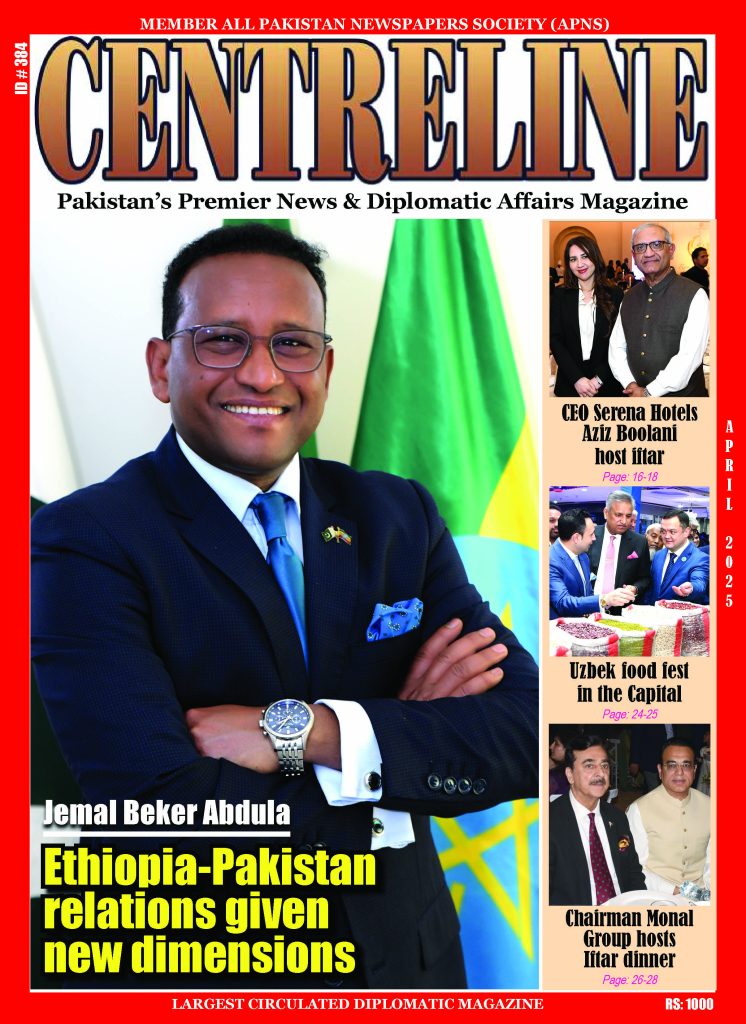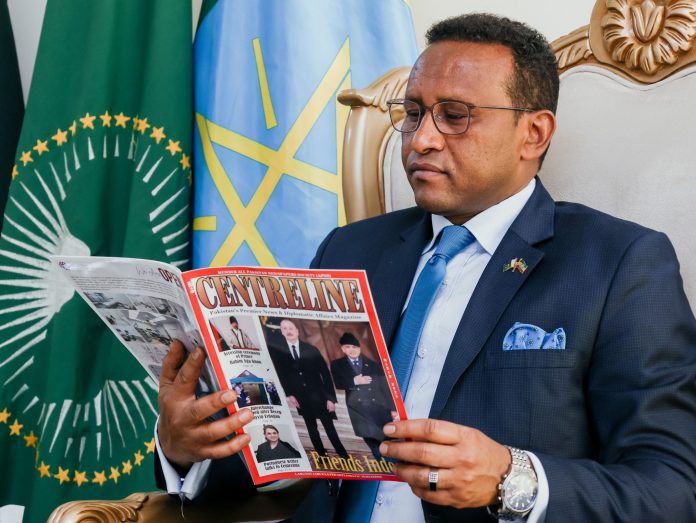Ambassador of Ethiopia to Pakistan Jemal Beker Abdula gave an exclusive interview to CENTRELINE, Daily Islamabad POST and Diplomatic News Agency (DNA). Here are excerpts from his interview. Here is the Part-1 on of the interview.
Ansar Mahmood Bhatti
1: Could you share insights into your journey as a diplomat/politician and how it led you to your current role as the Ethiopian ambassador to Pakistan?
Let me say it with great humility that my deep passion for my country and diverse experiences has made my journey to becoming Ethiopia’s Ambassador to Pakistan a fascinating and fulfilling one. It all began in 2003, fresh out of university, with a deep commitment to education. Those four years spent as an educator were truly formative, shaping my understanding of human potential and the power of knowledge. The classroom was my first diplomatic arena, where I honed my skills in communication, understanding diverse perspectives, and fostering growth.

But the call to serve my country on a larger scale motivated me to the foreign services in 2010. In a first, I joined the Ministry of Foreign Affairs of the Federal Democratic Republic of Ethiopia (FDRE) after getting six months diplomatic training, initiating my journey as an International Organization Officer that further launched me into a dynamic path where I had both the honor and privilege of serving in various capacities – from consular services and public diplomacy to the Director for Middle East. Each role presented unique challenges and opportunities, allowing me to develop a comprehensive understanding of international relations.
My dedication and proactive approach didn’t go unnoticed. Soon, I was entrusted with the crucial task of establishing Ethiopia’s Embassy in Canberra, Australia, as Minister Counsellor for Economic Diplomacy. Laying the groundwork for a new diplomatic mission was incredibly rewarding. It demanded strategic thinking, resourcefulness, and a proper skill for building bridges between nations.
This experience stimulated a passion into me for pioneering new frontiers. So, when I was appointed State Minister of Innovation and Technology in 2018 upon returning from Australia, I got the chance to drive transformative change. I along with my team spearheaded initiatives like technological solutions for agriculture, industry, office services, startups, and fintech, modernizing government operations and fostering a culture of innovation and creativity.
Perhaps, this pioneering spirit led me to become Ethiopia’s First Ambassador to the Kingdom of Bahrain in 2020. Once again, I found myself building something new, strengthening ties, and fostering collaboration between the two nations.
And now, I have the immense honor of serving as the first Ethiopian Ambassador to Pakistan—a nation I deeply admire, respect and love. For the last two and half years, I have been striving to cultivate a strong and long lasting partnership between our two countries, working day in and day out to foster understanding and establish cooperation.
You could say, I have become something of an expert at establishing new missions, forging fresh connections and pioneering innovative approaches. I really thrive on the challenge of building something meaningful and lasting. And, now I am incredibly excited to embark on this new chapter in Kyrgyz Republic, and Turkmenistan where I have presented my credentials as a non-resident Ambassador of Ethiopia in December 2024, whereas the same honor I had in the Republic of Tajikistan in January 2025.
2: How would you describe the historical and current state of diplomatic relations between Ethiopia and Pakistan?
Historically, the FDR Ethiopia and the Islamic Republic of Pakistan are the two brotherly nations that share a lot of commonality. Ethiopia, the land of revered figures like Hazrat Bilal Habeshi and King Nejashei, holds a special place in Islamic history that fosters the affinity between the two countries.
Bound by a deep sense of brotherhood, rooted in historical, cultural and religious connections, these two nations have developed a bond of mutual respect and understanding since establishing the formal diplomatic ties in 1958.
This connection went one step further with landmark visit of President Zulfikar Ali Bhutto to Ethiopia in 1972, which paved the way for enhanced collaboration and the establishment of Pakistan’s Embassy in Addis Ababa a year later.
Over the decades, Ethiopia and Pakistan have consistently demonstrated their commitment to mutual support on the world stage. They have stood shoulder-to-shoulder in international forums, championing shared interests and pursuing collaborative initiatives that uplift their people and contribute to global well-being.
The dawn of a new era in Ethiopian foreign policy, ushered in by Prime Minister Dr. Abiy Ahmed in 2018, brought renewed focus to the relationship with Pakistan. Recognizing Pakistan’s strategic significance, its unwavering support during challenging times, and its potential as a valuable partner, Ethiopia has actively sought to deepen ties.
Pakistan, in turn, has long recognized Ethiopia’s vital role in the Horn of Africa and African continent, a region rich in economic promise and natural resources. This recognition is embodied in Pakistan’s “Look and Engage Africa Initiative,” which identifies Ethiopia as a key gateway to the African continent.
Today, the bilateral relationship between Ethiopia and Pakistan is flourishing. The opening of the Ethiopian Embassy in Islamabad is a manifestation of this deepening bond and has facilitated increased trade, investment, and people-to-people exchanges. The Ethiopian Airlines now connects Karachi and Addis Ababa with four weekly flights, fostering greater connectivity and facilitating business and tourism.
Furthermore, high-level delegations from both countries have exchanged visits, culminating in the signing of multiple Memoranda of Understanding in diverse sectors like trade, investment, science and technology. These agreements pave the way for enhanced cooperation and shared prosperity.
As the world undergoes rapid transformation, Ethiopia and Pakistan are all set to elevate their relationship to a strategic partnership. By building on their historical ties and shared values, they have the potential to bolster bilateral, regional, and multilateral cooperation for the mutual benefit of their people and the international community.
3. What are the key areas where Ethiopia and Pakistan are collaborating economically? Are there untapped sectors with significant potential?
Economic collaboration between Ethiopia and Pakistan is gradually increasing, particularly since the establishment of the Ethiopian Embassy in Islamabad. This has facilitated numerous trade delegations and agreements, fostering partnerships in sectors like pharmaceuticals, surgical, agriculture, agro processing and textiles.
In the past two years, high-level delegations from both sides have explored avenues for collaboration in each other countries. A prime example is the 75-member Pakistani business delegation that visited Ethiopia in 2023, representing major chambers of commerce and prominent companies from all spheres and sectors of Pakistan. This visit resulted in the Islamabad Chamber of Commerce signing a crucial agreement with its Ethiopian counterpart, laying the groundwork for enhanced bilateral trade.
Furthermore, leading Pakistani corporations like Arif Habib Group and Roshan Packages have also signed MoUs with the Ethiopian Investment Commission in 2023, pledging significant investments in key sectors such as fertilizer production, construction, and packaging.
The momentum continued with a reciprocal visit by a 50-member official and business delegation from the FDR Ethiopia in May 2023 which signed multiple agreements with the different business chambers including Islamabad and Karachi.
Likewise, we have facilitated an 80-member business and investment delegation from Pakistan to Ethiopia in 2024, which included representatives from the Trade Development Authority of Pakistan and various trade associations and companies. This visit yielded further agreements, with the Faisalabad and Sialkot Chambers, along with the Sundar Trade and Industry Association, signing MoUs with the Ethiopian Investment Commission. These agreements have opened doors for collaboration in diverse fields including agriculture, pharmaceuticals, surgical equipment, sports and leather goods.
Current trade between the two countries includes pharmaceuticals, surgical supplies, agricultural products, textiles, and leather goods. However, both the nations need to recognize the vast untapped potential for growth. Ethiopia, for instance, imports a substantial portion of its pharmaceutical and surgical products, presenting a significant opportunity for Pakistani exporters. Conversely, Ethiopia’s fertile lands offer Pakistan access to high-quality agricultural commodities like coffee, tea, pulses, soybeans, and oilseeds.
By capitalizing on these untapped opportunities and fostering a spirit of partnership, Ethiopia and Pakistan are set to reap significant mutual benefits and drive economic growth for both nations.
4: What measures are being taken to enhance trade volume between Ethiopia and Pakistan, and what products or industries could benefit the most?
Ethiopia and Pakistan are actively pursuing a multi-pronged approach to bolster bilateral trade. Beyond the high-profile trade delegations and agreements, a concerted effort is underway to cultivate deeper economic ties.
The Ethiopian Embassy in Islamabad has played a pivotal role to this end. Through targeted outreach, the embassy has engaged with chambers of commerce across Pakistan, from the Federation of Pakistan Chambers of Commerce & Industry to local chambers in key cities like Karachi, Lahore, Faisalabad, Sialkot, Multan, Gujranwala, Shekupura Rawalpindi and Islamabad. These engagements have included presentations and briefings highlighting the diverse investment opportunities in Ethiopia’s burgeoning economy.
I personally visited all those business chambers and addressed to the queries of the business community.
Likewise, in 2024, the Embassy organized multiple business forums across Pakistan, coinciding with the second Pakistani trade delegation visit to Ethiopia. These forums provided a valuable platform for businesses from both countries to connect, explore partnerships, and gain insights into specific sectors ripe for collaboration.
Formalizing this commitment, Ethiopia and Pakistan have also signed and ratified a bilateral trade agreement, providing a framework for enhanced trade and investment.
Further strengthening these ties, Ethiopian Airlines now offers direct flights to Pakistan, facilitating seamless travel for businesses and fostering people-to-people exchanges between Pakistan and Ethiopia and the rest of Africa.
These combined efforts have successfully established institutional linkages between the two countries, leading to a regular exchange of delegations across various sectors. This momentum promises to unlock the immense potential for trade between Ethiopia and Pakistan. This year, Trade Development Authority of Pakistan along with Ministry of Commerce in Partnership with Ethiopian Embassy organizing the Single Country Exhibition in Addis Ababa, Ethiopia in between 15-17 May 2025 where many African countries join the forum to connect with the participants from Pakistan. In this regard, I kindly invite the interested companies to seize the availed opportunities.
To be concluded

















